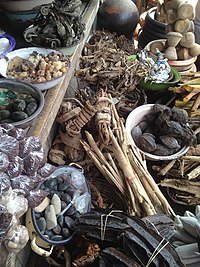
Photo from wikipedia
Practitioners of traditional African medicine (traditional healers) are an important part of the health care system in South Africa, yet their voices are often absent from discussions about public health.… Click to show full abstract
Practitioners of traditional African medicine (traditional healers) are an important part of the health care system in South Africa, yet their voices are often absent from discussions about public health. In this context, we set out to investigate how a group of traditional healers in South Africa understand suicide and suicide prevention. In-depth, semistructured interviews were conducted with 6 traditional healers and analysed using thematic content analysis. The traditional healers report they are frequently consulted by suicidal individuals and they are confident about their ability to help people in a suicidal crisis. Findings suggest that traditional healers understand suicidal behaviour as a symptom of social disconnection and cultural discontinuity. Traditional healers report that suicidal individuals can be helped by reestablishing interpersonal connections, reconnecting to family and ancestors, and renewing their cultural identities through rituals. These findings suggest that there is some congruence between the way traditional healers understand suicide and the Western scientific and biomedical literature. Our findings raise important questions about cultural approaches to suicide research which are commonly premised on dualistic thinking that constructs culture as something distinct from Western biomedicine.
Journal Title: Transcultural Psychiatry
Year Published: 2018
Link to full text (if available)
Share on Social Media: Sign Up to like & get
recommendations!